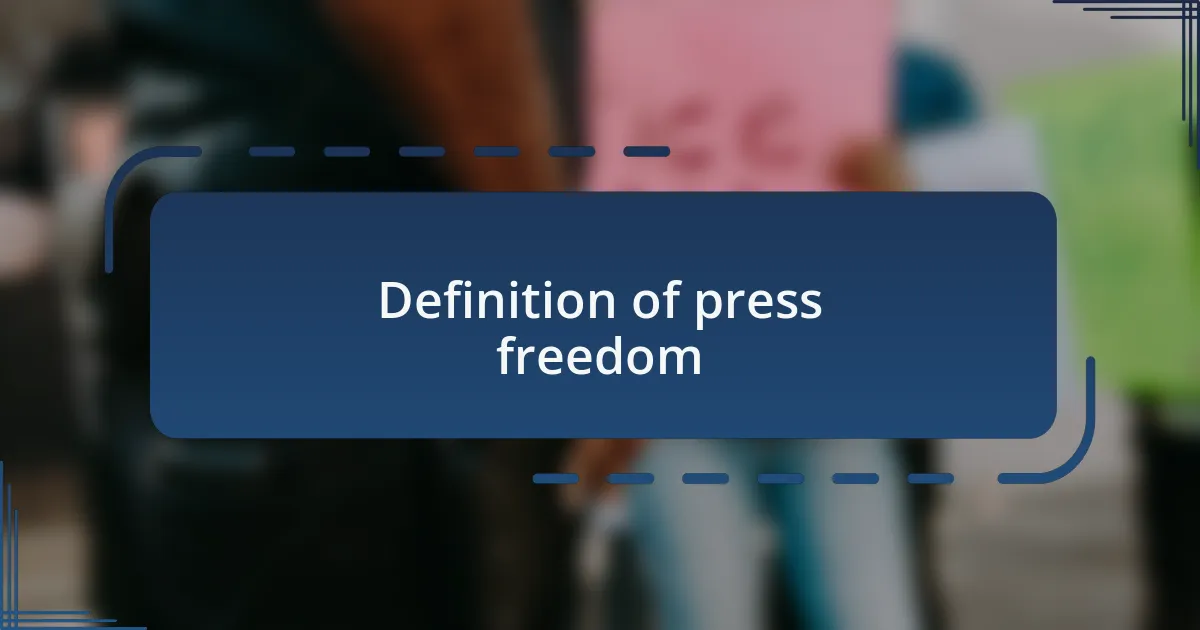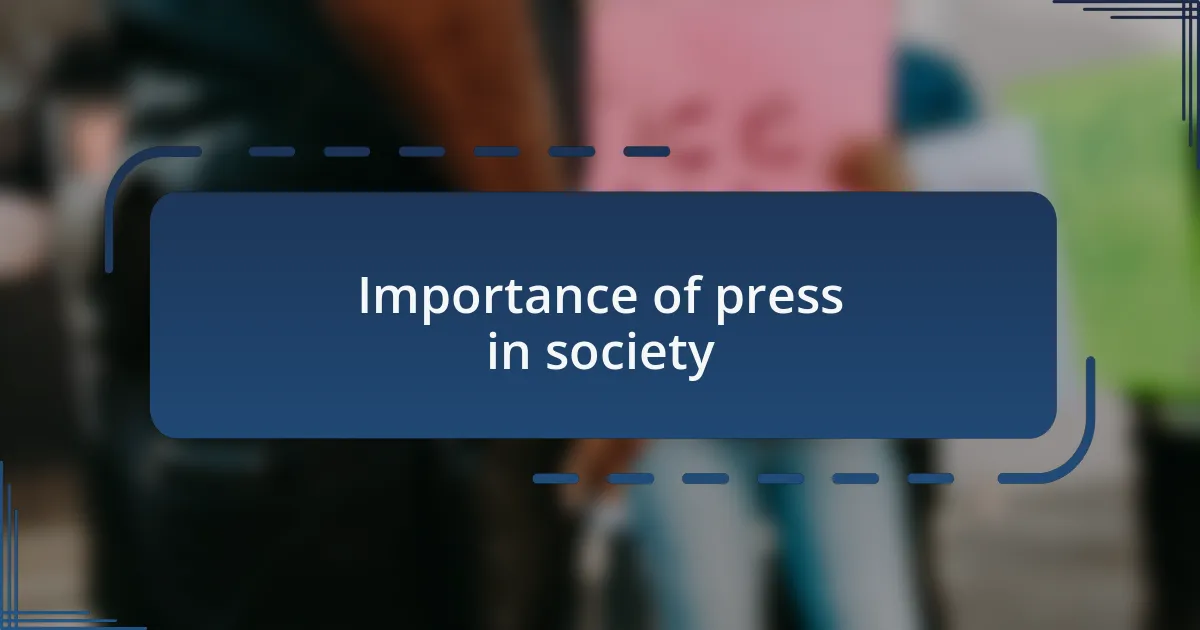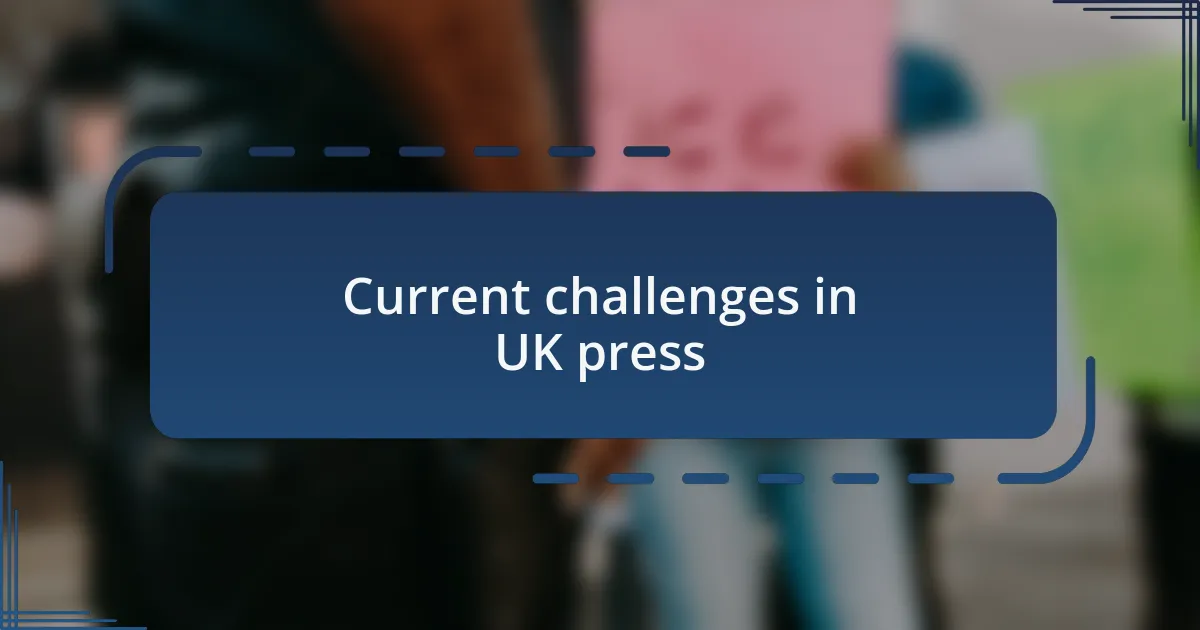Key takeaways:
- Press freedom is essential for democracy, allowing diverse viewpoints and holding power accountable.
- The UK press faces financial challenges, leading to sensationalism and compromised journalism quality.
- Misinformation and government scrutiny threaten the credibility and independence of the press.
- Personal experiences illustrate the vital role of journalists in informing the public and advocating for accountability.

Definition of press freedom
Press freedom is fundamentally the right of journalists and media outlets to report news and share information without censorship or restraint from the government or other powerful entities. This concept is crucial for a functioning democracy, as it allows for the dissemination of diverse viewpoints and holds those in power accountable. Have you ever wondered how free speech could influence societal change?
From my perspective, true press freedom goes beyond just having the legal right to publish; it encompasses an environment where journalists can operate safely and without fear of repercussions. I recall a time when I read an investigative piece that unveiled corruption in local government, highlighting how vital this freedom is for public awareness. It struck me then how fragile that autonomy can be and how easily it can be compromised.
Moreover, press freedom facilitates an informed citizenry, empowering individuals to make decisions based on a variety of perspectives. This diversity in reporting enriches public discourse, drawing us into discussions we might not have considered otherwise. When you think about the sources of information you rely on, do you ever reflect on how much those sources shape your understanding of the world?

Importance of press in society
The press plays a crucial role in shaping society by functioning as a watchdog, ensuring that power is held accountable. I vividly recall a documentary I watched on investigative journalism, which revealed the extent of corporate corruption in environmental issues. It struck me how essential the press was in uncovering truths that would otherwise remain hidden, leading to a collective awakening among the public. Without the press, would we even be aware of these pressing concerns?
Additionally, a free press fuels the democratic process by fostering open debate and dialogue. I often find myself drawn into discussions sparked by news articles, where different viewpoints collide and ideas evolve. This exchange of information not only broadens my understanding but invites me to question my own assumptions. Have you ever considered how a thought-provoking article could shift your perspective on a critical issue?
Furthermore, the presence of a vibrant press enriches cultural and social life by highlighting diverse voices and narratives. I remember skimming through an article that featured a local artist whose work echoed the struggles of our community. It personalizes issues, transforming statistics into stories that resonate on an emotional level. In a society where connections matter, how can we neglect the importance of these narratives in fostering empathy among us?

Current challenges in UK press
Current challenges in UK press
The UK press is currently grappling with a significant financial strain, which compromises its ability to operate independently. I’ve seen firsthand how news organizations are forced to make tough choices, often sacrificing quality for clicks. This relentless chase for online traffic can lead to sensationalized stories that detract from the meaningful journalism we desperately need. Have you ever clicked on a headline only to feel let down by the shallow content?
Moreover, the rise of misinformation poses a daunting challenge to the credibility of the press. I often reflect on social media’s role in shaping public perception, wherein misleading headlines spread like wildfire. This situation makes it harder for reputable journalists to regain trust once lost, leaving many to wonder: how can we differentiate between reliable news sources and those that merely seek to provoke outrage?
Finally, increasing government scrutiny and regulation can stifle press freedom, making it a precarious time for journalism in the UK. I worry that as legislation aims to tackle harmful content, it may inadvertently hinder the press’s ability to investigate matters of public interest. Can we truly have a balanced democracy if our journalists are silenced? These challenges beckon us to consider the vital importance of protecting the freedom of the press for the health of our society.

Personal experiences with press freedom
Reflecting on my interactions with the press, I remember a time when I attended a local council meeting. Journalists were present, eagerly documenting the discussions, which revealed critical issues affecting our community. It struck me how their presence not only informed the public but also held officials accountable, highlighting the essential role of a free press in our democracy.
A few years ago, I had the unique opportunity to collaborate with a reporter on an investigative piece about economic disparities in our area. Throughout this experience, I witnessed the dedication that goes into uncovering the truth, often at great personal risk to the journalists involved. I often wonder: what drives someone to pursue stories that could lead to backlash, yet are crucial for the public good? It’s this commitment that reinforces my belief in the value of press freedom.
However, I have also encountered the less glamorous side of the press when working on freelance projects. There were moments when editorial biases emerged, steering stories in directions that felt misleading or sensationalized. Have you ever felt that twinge of unease when a story seemed more about shock value than genuine reporting? These experiences shaped my understanding of the complex landscape in which our media operates, making me appreciate the vital need for independence and accountability within journalism.